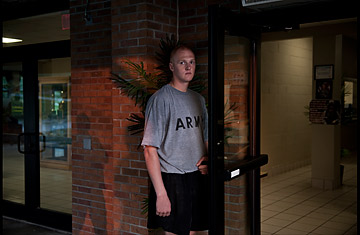
A recruit at Fort Jackson holds open the door to the mess hall during breakfast hours.
(6 of 8)
The Afghanistan episode reveals how frayed trust between the civilian and military worlds has become. Instead of arguing its position quietly behind closed doors, the Pentagon executed a pincer movement on the White House to get its way on the size of the Afghan surge. And when the pullout announcement neared, the White House confected the illusion of a Pentagon blessing on the timetable where none existed. "There will be more cases like this because the relationship is getting rockier with the major domestic and international challenges we face," says Michael Desch, a political scientist and military scholar at Notre Dame. "That's troubling in a democracy."
And then there are the individual costs of an army apart. A pair of Air Force researchers suggests the divide may be behind the suicide epidemic now plaguing the U.S. military. The burdens placed on a tiny slice of Americans during long and increasingly unpopular wars "have consequences that may include the creation of a constellation of social, cultural, and political conditions which conspire to elevate the rate of suicide in the Army and Marine Corps," write George Mastroianni and Wilbur Scott, behavioral experts at the Air Force Academy. "The public seemingly has little patience for anyone wishing to disturb the comfortable arrangement that now exists between society and the military, an arrangement facilitated by the lack of honest, thoughtful, and open dialogue," they say in the latest issue of Parameters, the Army's professional journal.
Restoring the Common Defense
Of course, some of the gap between the military and its patrons would evaporate if different kinds of people joined up. "The all-volunteer force," says retired Army major general Dennis Laich, "is a mercenary military made up of poor kids and patriots from the third and fourth socioeconomic quintiles of our country. The first socioeconomic quintile is AWOL, but that's where the real decisionmakers and policymakers of the country come from." Military scholars like Eliot Cohen of the Johns Hopkins School of Advanced International Studies agree with Laich that it would be good for the nation if more graduates of elite colleges signed up for military service. But Cohen adds that it might not be good for the military. "They're not necessarily the kind of people who fit very easily into the cultures of the services," Cohen says. "They're outliers, more headstrong, and they may be more likely to be skeptical."
The problem is even more noticeable on Capitol Hill, where the share of veterans among lawmakers has fallen from 77% in the late 1970s to 22% now. The dramatic lack of knowledge and experience among the Pentagon's overseers means the military gets more and more of what it wants. Representative Howard "Buck" McKeon, the California Republican who heads the House Armed Services Committee, never served in uniform--an unthinkable arrangement just a few decades ago. McKeon was stumped in September when asked in public if the military's "tooth-to-tail" ratio--the share of trigger pullers as part of the entire force--had budged from its historic 10% level. "What is tooth to tail?" the chairman responded. "Congress cuts the military slack because of their lack of experience," UNC's Kohn says. "They don't have a sense of the institutions and the culture, so they're less likely to exercise insightful or determined oversight."
